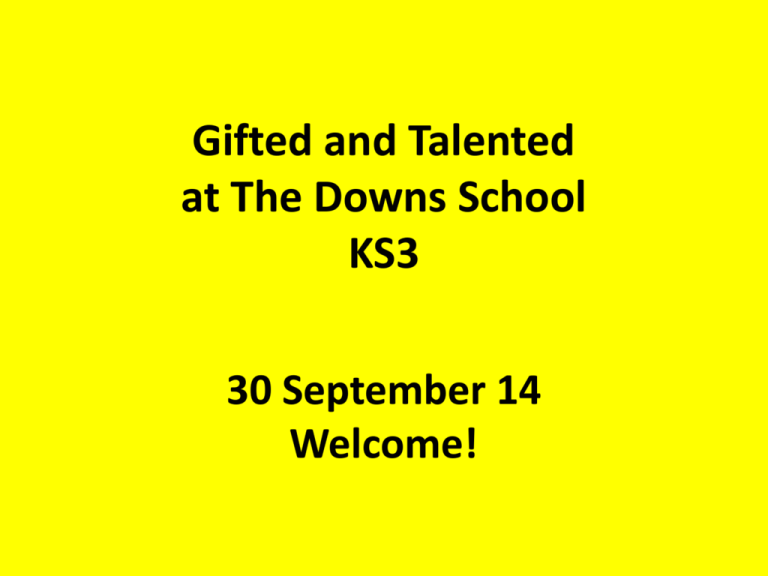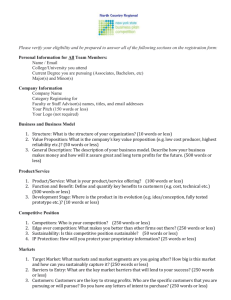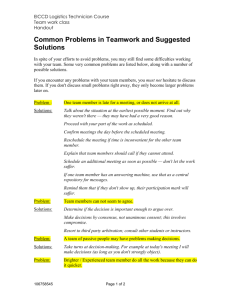Theories about intelligence
advertisement

Gifted and Talented at The Downs School KS3 30 September 14 Welcome! Mr Hartley: Head of Sixth Form Mrs Seath: Able Pupil Co-ordinator Why were you invited? Open to all parents Year 7 : high CAT4 results - or high KS2 results Year 8 : either of the above, or / and on G&T register What is intelligence? Growth mindset Nature of intelligence • Innate or acquired? • Fixed or flexible? How we define intelligence will make a difference to how we provide for it. Theories about intelligence Late 19th to early 20th century: • Galton, Spearman, Burt • Intelligence is general, fixed, and can be measured through standardised tests • Used to reinforce social, racial, sexual prejudices Theories about intelligence 1960s and 1970s: • Intelligence can be general or specific to a particular domain • Questioned idea of fixed intelligence Theories about intelligence Theories about multiple intelligences: • Eg Fisher and Gardner • Tried to define different kinds of intelligences • Includes types not measured by schools, eg personal, social, existential • Implications? What kinds of intelligences do we value/ measure/ provide for in school? Theories about intelligence Sternberg: • Practical • Personal • Intellectual • IQ not a good predictor of success. Social skills also important. • Can’t divorce intelligence from social existence. Theories about intelligence Vygotsky: ‘All the higher functions originate as actual relations between human individuals.’ ‘With assistance every child can do more than he can by himself.’ (Social nature of learning) Current research suggests that intelligence can be acquired and is flexible. What implications does this have for the teaching, learning and assessment of the ability of pupils? Teachers should be constantly aware of the need to look out for the emergence of new abilities in students. So… Register should be a working document that should be regularly updated: used to be every reporting time -now once a year Most provision for able pupils must be inside the classroom rather than extra-curricular. Provision should be inclusive. ‘ Diagnose and treat’ • Definition of Gifts and Talents • Identification of relevant children • Provision to meet their needs THE DIP/PIP CYCLE define provide identify Teaching of AGT students is about good teaching for all. All pupils will benefit, not simply the most able. The Downs School Gifted and Talented Policy - inclusive - NOT exclusive What are the principles of the G&T policy at The Downs School? Flexible intelligence – we can learn to be brighter – the growth mind-set Inclusion – not exclusive opportunities for some Nurturing of latent / emergent ability Prevention of underachievement What are the principles of the G&T policy at The Downs School? Continuous cycle of provision – identification – provision Flexible register – updated on a yearly basis Register is one of the tools used by teachers to help them provide appropriate challenge for their students What are the principles of the G&T policy at The Downs School? Provide for the most able in lessons Extra curricular provision open to all students All lessons should seek to challenge and inspire all students, including the most able, and should be differentiated to allow for all students to achieve their best What are the principles of the G&T policy at The Downs School? Connections between subjects Departmental responsibility for identification and provision Value and nurture different types of intelligences and skills What we believe about learners can affect their performance How do we define G&T at The Downs School? -in general -in specific subjects - school website An able pupil is one who has the potential to achieve highly in one or more areas, significantly beyond their age and peers • Gifted – academic subjects eg English, Maths • Talented – practical subjects eg Dance, PE, Art, Cookery • Able – high achievement in several subjects Renzulli’s Three Ring Model Task commitment Above-average ability Creativity Domain Specific Ability Tannenbaum’s Starfish model General Cognitive Ability Chance/Opportunity eg. access, experience Other Dispositional Factors eg. persistence, self-esteem Environmental Factors eg. learning experiences, expectations Downs School G&T categories Sliding scale of G&T nominations designed to help teachers consider emerging intelligences, not just who’s getting the best marks EA Exceptionally Able AA Able Achiever AU Able Underachiever SA Specific Aspect SE Soft Evidence Decisions about what constitutes these G&T categories in a subject have been discussed and agreed upon within departments: these categories are only useful if they are a commonly understood code between teachers. Creative motivated initiator (G&T): Decision about whether to nominate as AA or EA would depend on how many of these qualities are shown, and to what degree / intensity / consistency Asks questions Is highly curious Has wild silly ideas Plays around but tests well Discusses in detail; elaborates Beyond the group Shows strong feelings/ opinions Already knows Prefers adults Draws inferences Initiates projects Is intense Creates a new design Enjoys learning Manipulates information Inventor Good guesser Thrives on complexity Is keenly observant Is highly self-critical Competent hard worker (not G&T): Probably not a candidate for AA unless they have elements which go beyond this into the other column – don’t put them on the G&T register! Knows the answer Is interested Has good ideas Works hard Answers the questions Top Group Listens with interest Learns with ease Enjoys peers Grasps the meaning Completes assignments Is receptive Copies accurately Enjoys school Absorbs information Technician Good memoriser Enjoys straightforward, sequential presentation Is alert Is pleased with own learning AU : Able Underachievers Can do better in tests than class work Often get their sense of achievement from areas outside academic prowess Often know how they could improve their work but do not consider it worth the effort Are self aware and articulate Often do not take personal responsibility for their own progress Intervention required if not already in place – teacher / departmental responsibility SA: Specific Aspect Shows ability in a specific aspect of the subject but not across the whole subject. This might be indicative of latent or emerging ability. Recognition of high ability in a specific aspect of the subject might lead to setting work which would encourage development in other areas, or to increased confidence in the child leading to higher motivation SE: Soft Evidence A mismatch between the qualitative (soft) evidence and the quantitative (hard) evidence, eg a child might show high level thinking in discussion which is not matched by their written work. (If there are SEN the teacher would have to discern whether this was the cause of the mismatch.) Definitions of what each subject would define as showing high ability (EA, AA) to be on school website What to expect from The Downs: classroom provision Challenge and Inspire Our goals for the students • Students take responsibility for their own learning: • they devise their own questions; • they organise themselves effectively in groups; they construct tasks themselves to meet learning outcomes; • they respond to feedback so that their work improves; their work is well organised; • they can explain their level or grade and what they need to do to improve; • they can explain the purpose of their work; they can talk about how they are learning (learning habits and skills). Challenge and Inspire Targets for the classroom • Students are challenged at their different levels and work matches ability: • questioning is informed by an understanding of the hierarchy of thinking skills; • opportunities to support reading, writing and communication are taken in order to develop literacy, especially with weaker students; • there is opportunity for creativity, deepthinking, choice and extension within tasks; • all students are involved and contribute. Choice • Choice puts students at the centre of their own learning. • It creates ownership and engagement which leads to motivation and success. • Clear parameters are needed: explicit purpose, the learning objective, the level students should be learning at and how this will be assessed. • Some students and classes will cope better with choice than others; level of choice will be varied. Ability and the GROWTH MINDSET • Ability is the result of learning. • Focus on students’ ability to grow. • Through effort, motivation, hard work, perseverance, challenge and support, students can become more able. • Students who believe in the growth mindset are more likely to progress • Students who have fixed mindset will not value effort and will make less progress. For ability not by ability • Encourage a growth mindset in our students • Be vigilant for those whose ability emerges late and who can progress rapidly • Ensure all students progress to their full potential, ensuring that at times they struggle and have to tackle obstacles • Ensure that challenge is always provided and that those who are motivated and ready to do so can access more demanding work What to expect from The Downs School: -and what you can support at home... We seek to develop learning character: motivation self esteem resilience learning to learn thinking skills Praise and encouragement ‘Motivation is the key to the development of talent….the degree of motivation in young people is deeply bound up with their social environment, including cultural influences and their relationships…Students must feel that they have something unique to contribute…’ Csikszentmihalyi et al (1997) Help them develop self esteem • I’m not good enough so why should I bother? • ‘The efficient use of intelligence also depends on feelings of self esteem. These are shaped by emotional security and by protection from stress, since adventures into new ways of thought call for confidence.’ • Freeman (2001) Help them develop resilience Interaction of cognitive (brain functions) and affective (emotions): ‘Many able children lack the emotional resilience to the extent that it profoundly affects their capacity to demonstrate high levels of achievement’. Hampshire Primary Project Resilience - Van Leer • • • • • • • • • • • • unconditional love from at least one person count on family has a role model optimistic does endearing things believes in a power greater than seen willing to try new things likes to achieve believes they have an effect on the outcome likes him/herself can focus and persevere at a task makes plans to do things Strategies to help students with low self esteem • Montgomery: catch them being clever comment positively on pupils’ learning processes. • Dweck – praise effort and strategy rather than intelligence – resilience and motivation would then not be bound up in self image. Success to do with effort rather than personal qualities. Personal Learning and Thinking Skills • • • • • • Independent inquirers Creative thinkers Reflective learners Team workers Self managers Effective participators Bloom’s hierarchy of skills Remembering: recall or remember information - knowledge Understanding: explain ideas or concepts – comprehension Applying: use the information in a new way - application Analyzing: distinguish between the different parts - analysis Evaluating: justify a stand or decision - evaluation Creating: create new product or point of view? - synthesis Other aspects of the school’s provision for G&T NACE - National Association for Able Children in Education Whole school commitment to G&T Identification of high ability / talent School self evaluation and targets Provision: teaching and learning, curriculum, pastoral care Support for underachieving / disadvantaged students Staff training Support for exceptionally able students Effective use of resources inc ICT Student voice and responsibility Links with parents and stakeholders Monitoring and evaluation of provision for G&T Examples of current practices Exceptional Education Plans – being further developed across this year Celebrate Success! assemblies for all years G&T challenge days led by students Increased links between subjects Student voice – interviews and council G&T page on website Links with other agencies eg IGGY, Children’s University, MENSA, Potential Plus Information for parents Faculty G&T rep teachers Learning walks to audit different aspects of classroom practice, eg extension opportunities , adequate challenge Support for underachievers Developing practices… • Develop support given to specific groups of students: EA, AU, less advantaged • Students to be more involved in planning enrichment activities • Explore how to use enrichment for identification of untapped potential in all students • Developing further opportunities for student leadership: in lessons and across the school, eg School Development Plan • Peer mentoring: between older and younger students; within depts.; links to Compton Primary? • Using student expertise in creating subject specific websites • Students to be involved in action research • Other aspects of ability on register: leadership, entrepreneurship • Trial self / peer nomination for G&T register - with one year group only initially • ‘G&T community’ to have higher profile • Earlier links to Oxbridge – KS4 G&T page on school website: • How G&T is defined by subject teachers • How specific subjects provide for their most able students • Websites recommended by subject teachers • Parent site / General Info / scroll down to Gifted and Talented. International Global and Gifted Youth Connecting and challenging the world’s brightest young minds https://iggy.net Children’s University 7-14 yr olds opportunities outside school http://www.childrensuniversity.co. uk/ MENSA -provide a stimulating intellectual and social environment for its members -identify and foster human intelligence for the benefit of humanity -encourage research into the nature, characteristics, and uses of intelligence http://www.mensa.org.uk/ Potential Plus An independent charity which works with the whole family to support children with high learning potential. Works with parents and carers to DISCOVER the child's potential NURTURE their gifts and talents Work with parents and also with professionals to help children SUCCEED http://www.potentialplusuk.org/ AG&T in the Sixth Form Mr A Hartley excellence pursuing pursuing excellence FUTURE A BRIGHTER FOR FUTURE A BRIGHTER FOR AG&T and university What does it take to turn the latent ability into a place at a top university? excellence pursuing pursuing excellence FUTURE A BRIGHTER FOR FUTURE A BRIGHTER FOR Curiosity Joining societies Reading journals Newspapers Discussion group Radio 4 Going to lectures/events Going beyond the syllabus Learning doesn’t stop at 3.15 Participation excellence pursuing pursuing excellence FUTURE A BRIGHTER FOR FUTURE A BRIGHTER FOR Determination “I tell players that hard work is a talent, too.They need to work harder than anyone else. And if they can no longer bring the discipline that we ask for here at United, they are out. I am only interested in players who really want to play for United, and who, like me, are bad losers. ~Sir Alex Ferguson Too many bright students I have taught or been through school have regarded a place at a top university as a birth right. These universities have the pick of the global crop and will expect you to work at a very rapid pace when in college therefore they need evidence of commitment during school excellence pursuing pursuing excellence FUTURE A BRIGHTER FOR FUTURE A BRIGHTER FOR Academic qualifications to match the potential Cambridge -93% in AS examinations is the average mark for successful candidates Less than 89% as an average makes it unlikely you will get in! 7A*s at GCSE Entrance test scores at Oxford count very highly in their selection process Russell Group varies but an A average at GCSE followed up by AAA/AAB would be fairly typical although this is course dependent excellence pursuing pursuing excellence FUTURE A BRIGHTER FOR FUTURE A BRIGHTER FOR Student W Strong GCSE profile ( A average) Out of school- county runner, St John’s Ambulance, amateur dramatics Deputy Head boy Always helped at every school event Decent AS results but not specatacular Decided to drop Chemistry at A2 to do a double Level 3 BTEC in Production Arts- persuaded Mrs Bailey to support him. Got in to RADA on their Technical Theatre course and is now working at The Old Vic excellence pursuing pursuing excellence FUTURE A BRIGHTER FOR FUTURE A BRIGHTER FOR Student X Political opinions Broad range of ‘facilitating subjects’- did 5 A-Levels West Berkshire Youth Parliament Fencing Go-Karting 10 A*s at GCSE Law at Brasenose College , Oxford excellence pursuing pursuing excellence FUTURE A BRIGHTER FOR FUTURE A BRIGHTER FOR Student Y Geography at Oxford 95% average in AS examinations 50/50 in an Extended Project on the Icelandic volcano Wrote beautiful prose! Designed, made and sold jewellery on the internet 9A* at GCSE excellence pursuing pursuing excellence FUTURE A BRIGHTER FOR FUTURE A BRIGHTER FOR Student Z Veterinary Medicine at Cambridge Perfect reports all through school Worked very hard in Sixth Form staying late most evenings Huge amounts of personally sourced work experience- safari parks, Flamingo World, dairy farms, small animal work Amateur dramatics Enthusiasm knew no bounds excellence pursuing pursuing excellence FUTURE A BRIGHTER FOR FUTURE A BRIGHTER FOR Sports-related Courses 3 As at A Level (including at least one of Biology, Maths, Chemistry, Physics, Psychology, Sociology, History, English Language or Literature) Performance level in one sport at preferably County National level would illustrate quality of involvement Assisting in coaching and/or officiating younger students at school or external sports clubs and competitions would illustrate depth of involvement Work Experience in a sporting environment would show wider interest in a potential area of study excellence pursuing pursuing excellence FUTURE A BRIGHTER FOR FUTURE A BRIGHTER FOR What will the school do? Oxford trip Coaching and advice from the beginning of Sixth Form for ‘top 25’ students Summer school applications support West Berkshire Oxbridge/Durham evening West Berkshire Oxbridge master classes Support from teaching staff Interview practice with Downe House Q&A Suggestions – please use forms provided





